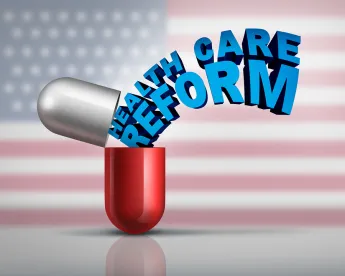This Week’s Dose
There was little activity in Congress with the House in recess, but we saw several developments in the Medicaid space including new guidance from the Centers for Medicare and Medicaid Services (CMS).
Administration
-
CMS Issued Guidance on Implementation of the SUPPORT Act. In a letter to state Medicaid directors, CMS encourages states to add new substance use disorder (SUD) services to their Medicaid programs through state plan amendments (SPAs), in keeping with the Administration’s efforts to address the SUD epidemic. The guidance implements Section 5052 of the SUPPORT Act, which amended the Medicaid institution for mental diseases (IMD) exclusion and established a new state plan option for SUD services. The law allows states to provide services to Medicaid beneficiaries age 21 through 64 who have at least one SUD diagnosis and reside in an eligible IMD from October 1, 2019, through September 30, 2023. States are increasingly looking for ways to cover IMD services through Medicaid. Twenty-seven states, and Washington, DC, use Section 1115 waivers to expand treatment for IMD services. (Washington, DC, recently received approval for such a waiver. More on that below.) Providing the option to use SPAs to cover IMD services gives states another avenue to expand coverage.
-
CMS Approved DC Medicaid Waiver to Expand Behavioral Health Treatment. The approved 1115 waiver will allow DC to expand IMD treatment services to Medicaid beneficiaries with serious mental illness (SMI) and SUD. The waiver removes the ban on federal matching funds for Medicaid services furnished at IMDs and eliminates the $1 co-pay for prescriptions associated with medication-assisted treatment for SUD through December 31, 2024. It also authorizes the District to offer several new community-based behavioral health services through December 31, 2021. The waiver is the first of its kind following a 2018 Trump Administration announcement allowing states to submit a combined substance use and mental health IMD waiver application. Many states and CMS have used 1115 waivers to expand coverage to substance use IMD services. Vermont is the only other state that has approval for a mental health IMD waiver, but that waiver is set to phase out. More states may begin applying for combined SUD/SMI 1115 waivers as they look for opportunities to receive federal funding for IMD services.
-
CMS Released New Medicaid Data. The Transformed Medicaid Statistical Information System (T-MSIS) data includes a collection of improved and new Medicaid and Children’s Health Insurance Program (CHIP) data files. According to CMS, the move is aligned with the agency’s goals to “promote data-driven solutions, help ensure sound program performance, support improvement, and identify and prevent fraud, waste and abuse in the Medicaid and CHIP programs.” T-MSIS data provides more comprehensive information on utilization, spending, Medicaid managed care, and home and community based services than was previously available. These data are intended to help researchers and policymakers better understand how the programs are operating. Researchers can access the T-MSIS data by submitting a request to the CMS Research Data Assistance Center and signing a CMS data use agreement.
Congress
-
House Will Not Vote on H.R. 3 Before December. Democratic leaders announced that they are delaying a vote on the Lower Drug Costs Now Act (H.R. 3), the Party’s preferred package of drug pricing reforms, until after Thanksgiving to give the Congressional Budget Office (CBO) time to estimate the cost or cost savings generated by the bill. Leadership had previously announced that they hoped to bring the bill to the floor as early as next week, but the CBO score is taking longer than anticipated. The delay adds pressure to the already tight end-of-year timeline. When the House returns from recess on November 12, Congress will have just a few weeks left in the legislative session to address government funding, the extension of several expiring healthcare programs, and any drug pricing legislation they want to move before the end of the year. As such, it seems increasingly likely that some of this work may slip into the beginning of 2020.
Courts
-
Court Blocked Immigration Health Coverage Requirement. A federal judge temporarily halted a recent Trump Administration policy that would require immigrants to prove they have health insurance or the means to pay for their healthcare before entering the country. The stay prevented the policy from taking effect on November 3, 2019, and will last through November 29, 2019. The Administration issued the policy on October 4, 2019, but the State Department did not announce how it would implement the order until October 30 when it issued an emergency notice with a 48-hour comment period. According to the judge, that notice may have violated the Administrative Procedure Act, which establishes guidelines for rulemaking. The court will hold another hearing on the request for an injunction on November 22. The White House has said it will vigorously defend the policy.
-
Court Blocked “Conscience Rule” for Health Providers. In yet another court defeat for the Trump Administration, a federal judge voided a policy that would have allowed healthcare providers to refuse to offer certain healthcare services that they disagree with on religious or moral grounds. A group of 26 states, municipalities and health advocacy groups sued to block the rule, which was originally set to take effect on July 22, 2019, but was delayed by the legal proceedings. The plaintiffs argued that the rule would disproportionately harm women and members of the LGBTQ community, and significantly disrupt the healthcare system, while the Administration insisted the policy was necessary to protect the religious freedom of healthcare providers. In his ruling, the judge held that the policy was unconstitutional and that the Department of Health and Human Services overstepped its authority in issuing it. The Administration has not said whether it plans to appeal.
States
-
Georgia Released Plan to Partially Expand Medicaid. The draft 1115 waiver proposal would expand the state’s Medicaid program up to 100% of the federal poverty line (FPL), falling short of the 138% threshold for full expansion outlined in the Affordable Care Act. Despite this, the plan still requests the full 90% enhanced federal funding match. The agency denied a similar waiver request from Utah in August after announcing that the full enhanced match would only be available to states that fully expanded Medicaid. In addition to the partial expansion, the plan would establish a work requirement similar to those proposed by Arkansas, New Hampshire, and Kentucky, which have been blocked in court. Unlike the previous proposals, the Georgia plan would require beneficiaries to prove they can work at least 80 hours per month before they enroll rather than simply to meet a monthly threshold once enrolled. The plan would also require certain beneficiaries with incomes between 50% and 100% of the FPL to pay premiums and co-pays or risk losing coverage. The state will accept public comments on the proposal through December 3, 2019. Georgia plans to submit the proposal, along with the 1332 waiver proposal announced last week, to CMS before the end of the year.
Quick Hits
-
CMS Released 2020 Medicare Physician Fee Schedule (PFS) and Medicare Hospital Outpatient Prospective Payment System (OPPS) and Ambulatory Surgical Center (ASC) final rules. Read our summary of the PFS rule here and our summary of the OPPS and ASC rule here.
-
President Trump announced that he intends to nominate Stephen Hahn as Commissioner of the Food and Drug Administration (FDA).
-
The Office of Management and Budget completed its review of FDA’s flavored e-cigarette ban.
-
A Democrat won Kentucky governor’s race, likely ending Medicaid work requirements in the state.
-
The Medicare Payment Advisory Commission met November 7 and 8.
Next Week’s Diagnosis
The House returns from recess and will begin public impeachment hearings, adding a layer of complexity to the already tight end-of-year legislative timeline.





 />i
/>i

